My restaurant quality Prime Rib Roast Recipe, also known as a standing rib roast, is a cut of beef most people think is too difficult to cook at home. The truth is cooking delicious, quality prime rib at home couldn’t be easier with my standing rib roast recipe.
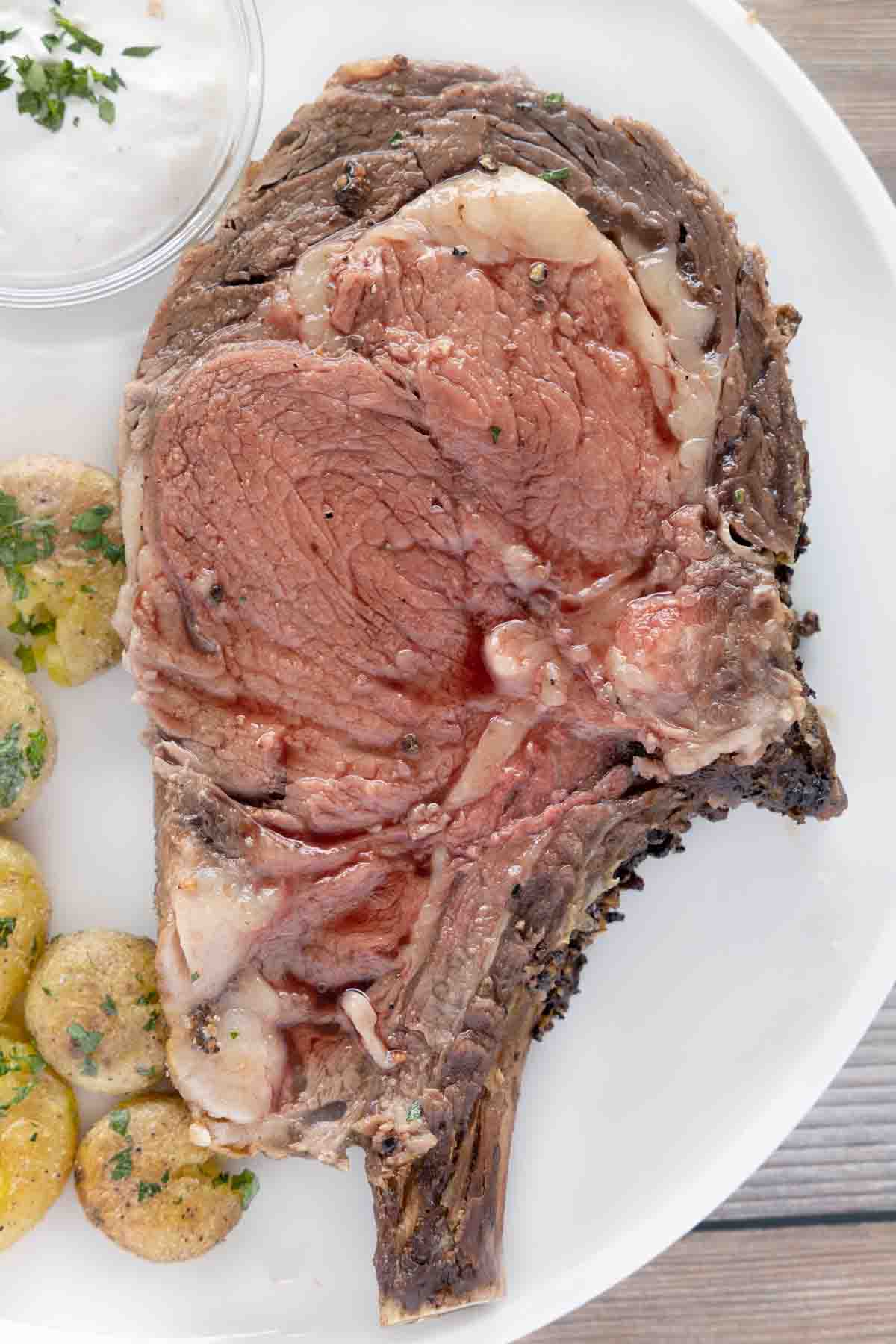
WANT TO SAVE THIS RECIPE?
Audio Player
Don’t wait for special occasions to make prime rib; it only takes 5 minutes to prep and 2 hours to cook the Perfect Prime Rib Roast, aka Standing Rib Roast.
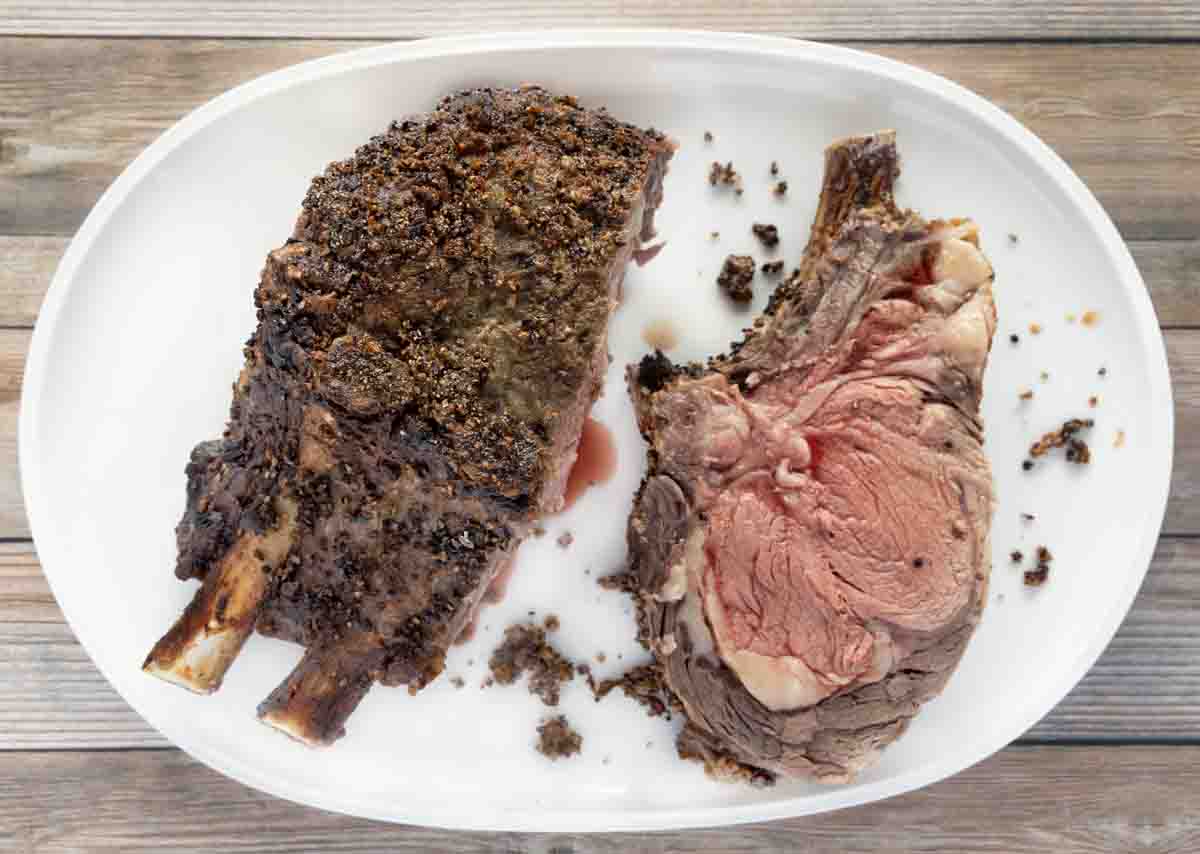
If you have time, let the roast sit in the fridge overnight (or up to 3 days if time permits) to let the seasonings work their magic on the prime rib.
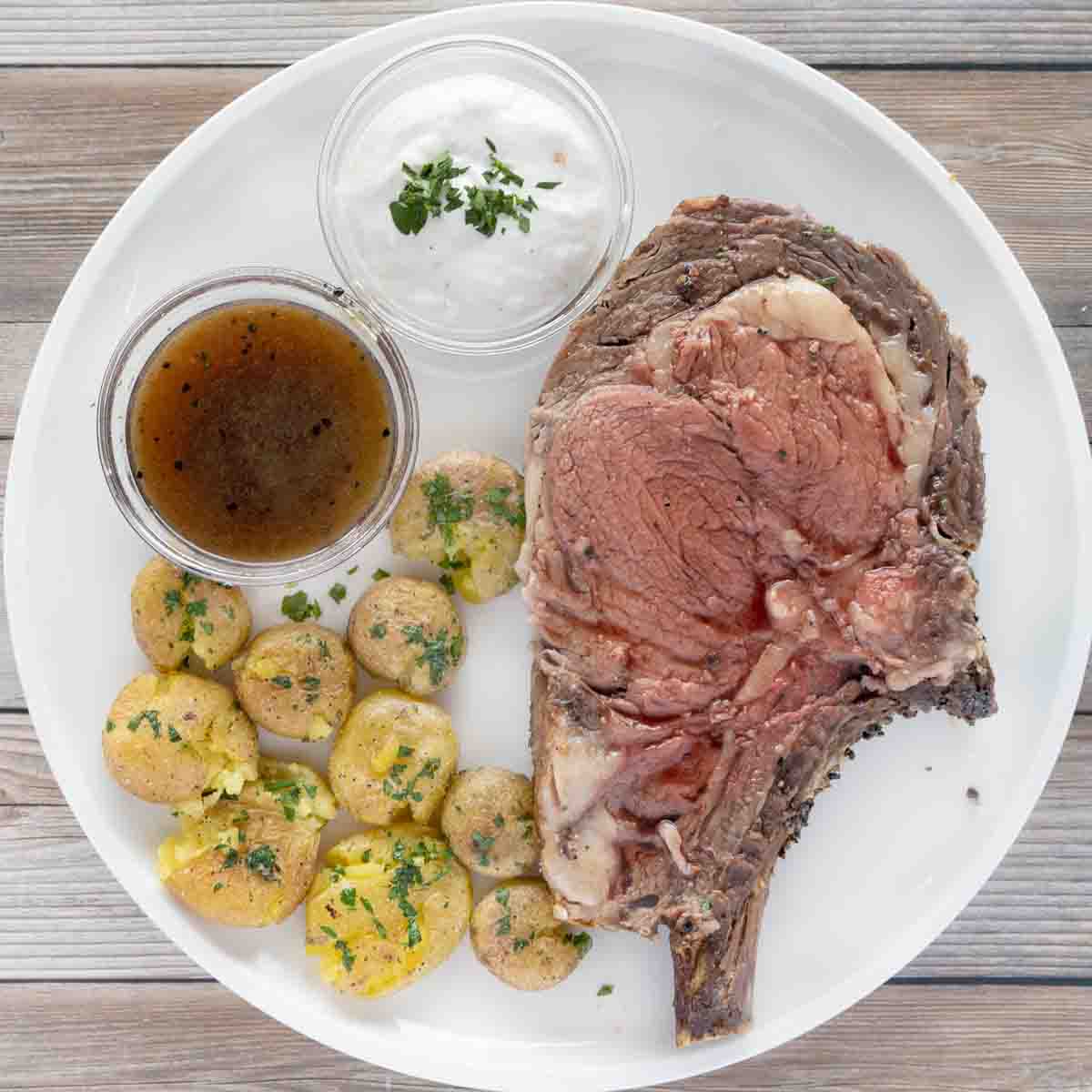
A prime rib roast is definitely the King of Beef, and the wow factor that comes with a cut of perfectly cooked prime rib is about as high as it can get.
Following my easy recipe will yield a perfect prime rib that’s rich, juicy, and tender. It’s not only a feast for the belly; it’s a feast for the eyes as well.
If you love beef, make sure to check out my top round roast beef, garlic herb bottom round roast and my amazing beef tenderloin recipe.
Ingredients
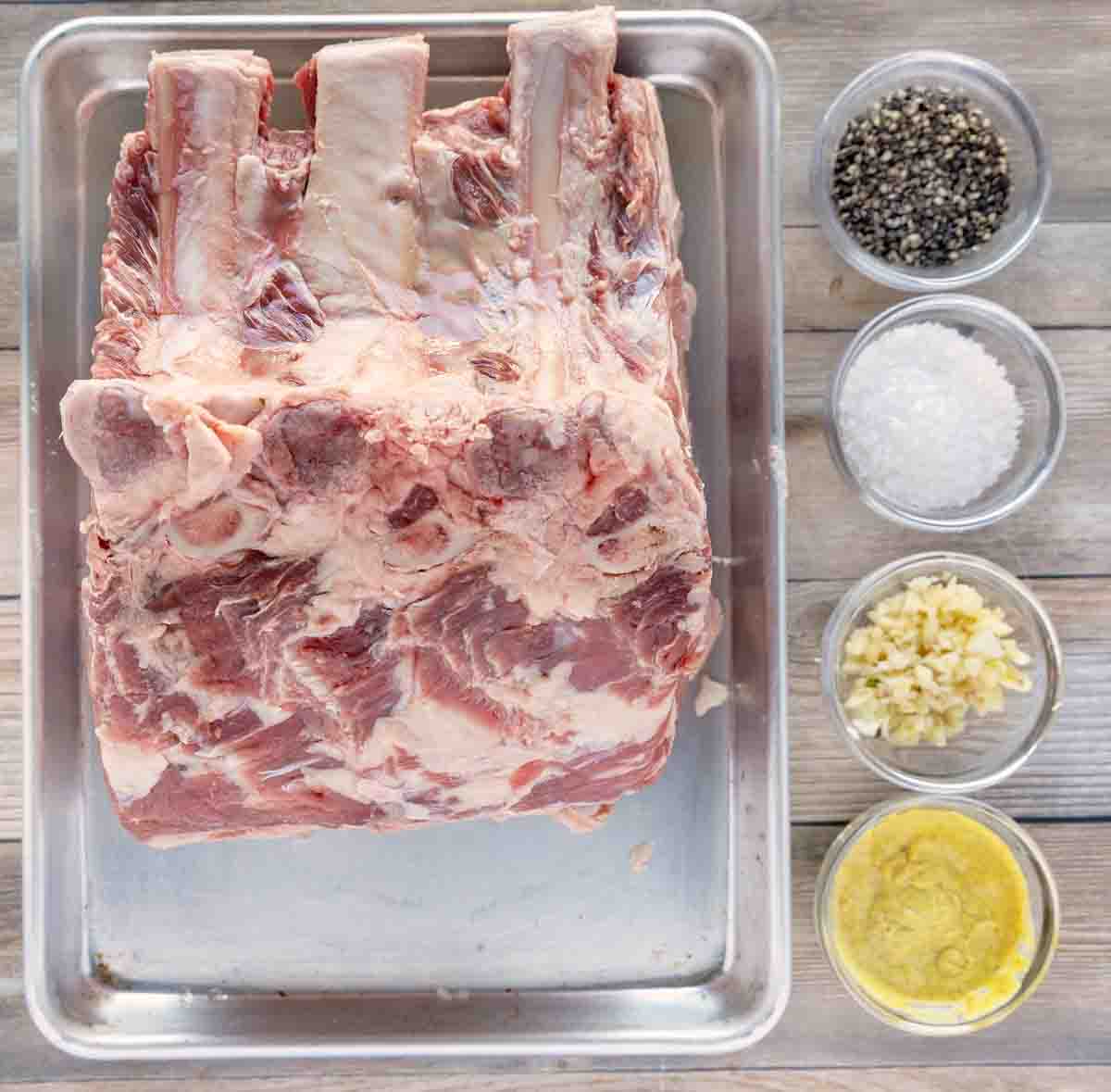
Let’s start by gathering the ingredients we need to make a Prime Rib Roast. In Chef Speak this is called the “Mise en Place” which translates to “Everything in its Place.”
Not only does setting your ingredients up ahead of time speed up the cooking process, it also helps ensure you have everything you need to make the dish.
*A Prime Rib Roast is considered a “Primal Cut of Beef.” A primal cut is a piece of meat initially separated from the carcass of an animal during butchering. Other primal cuts of beef are the loin, chuck, ribs, and round.
How much do I need?
A bone-in prime rib will feed 2 people per bone (about 1 pound per person, counting the weight of the rib bones). Use that guideline to plan how big of a roast you need. Of course, the number of sides and types of side dishes you are serving also comes into play. If you are planning a large meal with lots of accompaniments, you can scale back to ½ – ¾ pound prime rib per person.
If you can’t find a smaller prime rib roast at your local grocery store, a local butcher can probably help you out.
How do I know when it is cooked?
There is no getting around it; you need a meat thermometer to check on the internal temperature of the prime rib roast. You don’t want to keep opening the oven or taking the meat out to check with an instant-read thermometer. Invest in a good thermometer; it’s the best way to check the level of doneness of anything you cook in the oven or on the grill.
Roast your prime rib until the thermometer registers:
- 115-120˚F for rare
- 125-130˚F for medium rare
- 135-140° F for medium
- 145-150 F° for medium well
Please keep in mind that the meat temperature will continue to rise 5-10 degrees when it’s resting out of the oven, so don’t overcook the roast!
How to Cook a Prime Rib Roast
Follow along at home with my easy instructions to see how to cook a prime rib roast in your own kitchen!
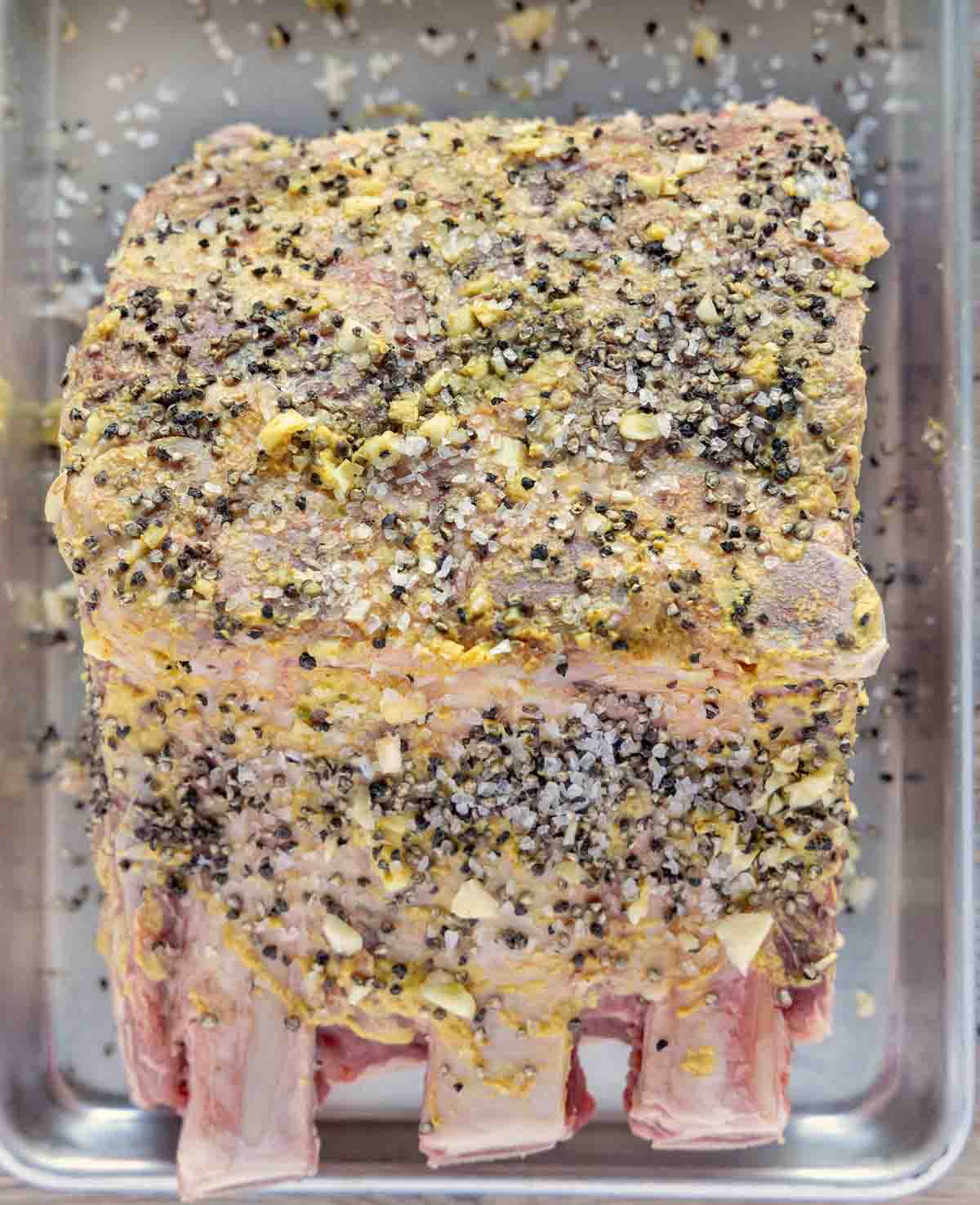
- Pat the roast dry using paper towels.
- Rub meat with Dijon mustard ( your favorite brown mustard or olive oil).
- Season the roast with coarse sea salt, cracked black pepper and minced garlic.
- Place roast in the refrigerator uncovered overnight (or up to 48 hours). This allows the surface to dry, which helps the roast brown and maintain juiciness.
Room temperature
The most important thing to remember when roasting a large piece of meat, like a standing rib roast, is to let the beef warm to room temperature before roasting the meat.
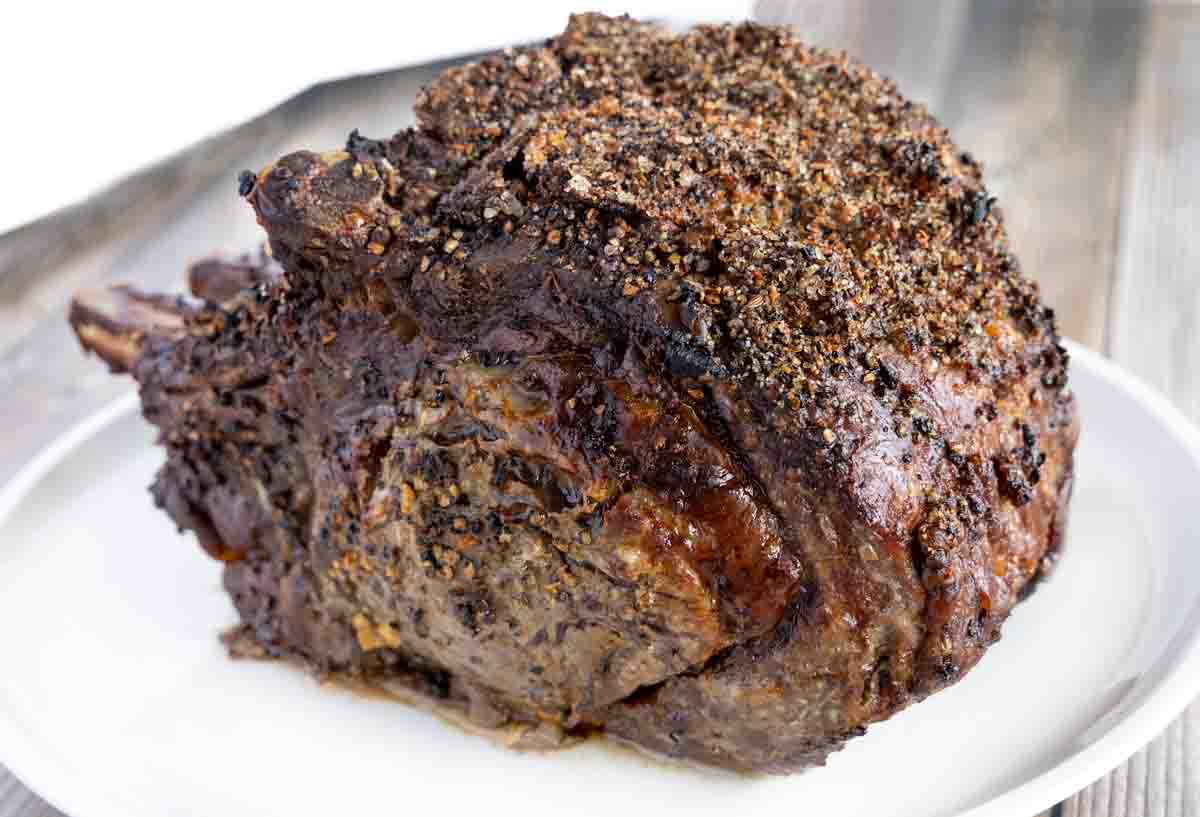
- Preheat the oven to 475°F
- Place the beef on a roasting pan, fatty side up.
- Roast the prime rib roast at 475°F for 25 minutes, then reduce the temperature to 300°F
- Let the prime rib continue to cook for 15 minutes per pound of roast.
- Use a meat thermometer to check the temperature. Prime Rib should not be cooked beyond Medium doneness.
- Remove the roast from the oven and tent the entire roast with foil. Let the meat rest for a minimum of 20 minutes before serving (30-40 minutes is preferable). The meat will continue to cook after taking it out of the oven, and the internal temperature of the meat will increase by 5-10 degrees.
If you need a more well-done piece, use the ends (first cut), they will be more fully cooked. You can also place the cuts of prime rib in a pan with au jus and gently heat the meat to increase the doneness. My wife loves meat, well, well, well-done and using the au jus in a saute pan, I was able to serve her a perfectly cooked well done prime rib.

Enjoying a delicious prime rib dinner in your own home really makes a night extra special. Serve it up with homemade horseradish sauce, au jus (see the recipe notes for instructions), buttery smashed potatoes, and your favorite green vegetable.
And if you do have leftovers, they make an amazing prime rib sandwich!
Recipe FAQs
A prime rib roast, also referred to as a standing rib roast, is the cut of meat that’s taken from the back of the upper ribs of the steer. This section is typically made up of about seven ribs, which is what restaurants use. You can find a smaller 3 or 4-bone roast, which is better for home consumption. You really don’t want to cook a prime rib roast smaller than that.
It’s always best to start at a high temperature (450 – 475 degrees is the optimal range). After 25 minutes at this temperature, change to a lower temperature (250 -300 degrees) is used to finish cooking the roast.
One cooking method I have never been fond of is Reverse Sear. It starts out at a lower temperature, lets the roast rest briefly, and then blasts it at 500 degrees to get the outside crisp. I prefer the traditional method of roasting meats.
Although a ribeye steak and a prime rib are both cut from the same rib section of the beef, they do have some differences.
The ribeye is cut from between the 6th and 12th ribs, which are considered to be the most tender and heavily marbled part of the ribs.
The other big difference in taste and tenderness is a cut of prime rib is cut off of a cooked roast, whereas ribeyes are individual cuts seasoned and cooked to order.
More Recipes You’ll Love!
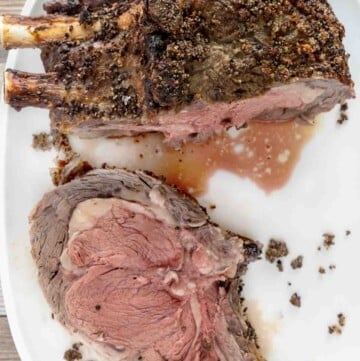
Prime Rib Roast Recipe
Ingredients
- 6 lb Prime Rib Bone-in roast will average between 5-8 pounds
- 1 tablespoon coarse sea salt
- 1 tablespoon cracked black pepper
- 4 cloves garlic minced
- 2 tablespoon Dijon or brown mustard *can use olive oil instead
WANT TO SAVE THIS RECIPE?
Instructions
- The night before you cook your Prime Rib, Pat the prime rib dry with paper towels.
- Rub meat with Dijon mustard ( your favorite brown mustard or olive oil).
- Season the roast with coarse sea salt, cracked black pepper and minced garlic
- Place roast in the refrigerator uncovered overnight (or up to 48 hours). This allows the surface to dry, which helps the roast brown and maintain juiciness.
- Bring Prime Rib to room temperature before roasting (takes 1-2 hours)
- Preheat oven to 475°F
- Place the meat on a roasting pan, fatty side up.
- Roast the meat at 475°F for 25 minutes, then reduce the temperature to 300°F
- Let the prime rib continue to cook for 15 minutes per pound of roast.
- Use a meat thermometer to check the temperature. Prime Rib should not be cooked beyond Medium doneness. For Rare take the roast out of the oven when the internal temp is 115°F. For Medium Rare, take the roast out of the oven when it reaches 125°F.If you need a more well-done piece, use the ends, they will be more cooked. Yu can also place the cuts of prime rib in a pan with au jus to make the meat more well done.
- Remove from oven, cover with foil and allow to rest for at least 20 minutes before serving. The meat will continue to cook after taking it out of the oven and the internal temp will increase about 10 degrees.
- Serve with au jus and creamy horseradish sauce

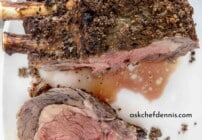
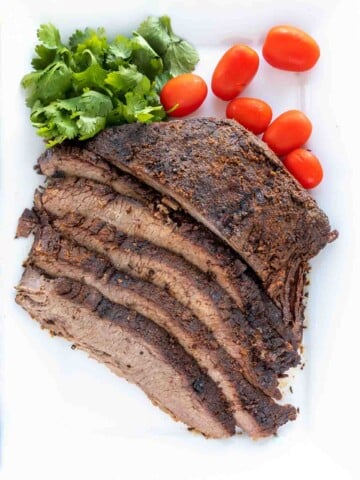
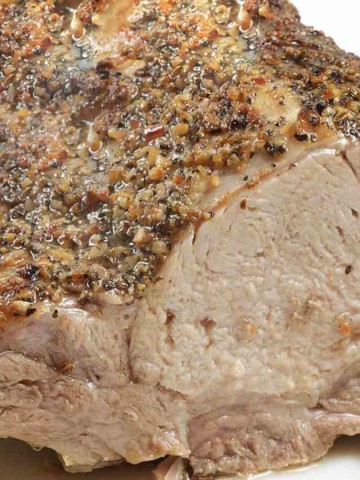
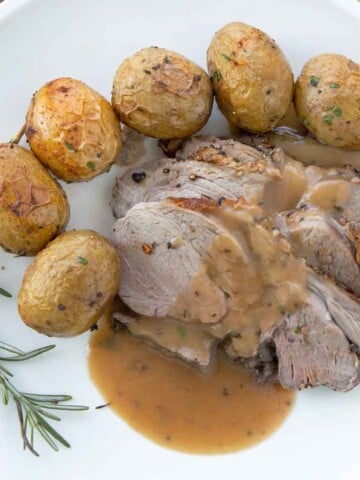
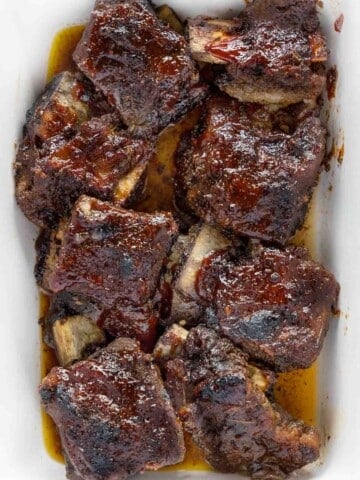
Michael says
Hello Chef,
For Valentines Day, I purchased a 3 lb. Prime Boneless Rib Eye Roast. Any suggestions you can offer will be appreciated in terms of modifying spices, roasting time and temp.
Many thanks…
Sandi Lusk says
Your prime rib roast looks perfect Chef Dennis but what would the timing and temperatures be for a 3.8 lb. prime rib with bone in be? Thank you from Canada!
Chef Dennis Littley says
Temperatures are all the same, follow the recipe, roasting for 25 minutes at 475, then reduce the temperatue to 300 degree and finish cooking for about one hour. But you need to use a meat thermometer to be sure its cooked the way you like it. For Rare take the roast out of the oven when the internal temp is 115°F. For Medium Rare, take the roast out of the oven when it reaches 125°F.
Lynne Enzweiler says
I discovered a smallish standing rib roast in the bottom of my chest freezer that had a 2021 date. Needless to say, I was sure I had a freezer-burned an expensive piece of meat, but I decided to thaw it out and see if any part of it could be salvaged. On Christmas Eve I decided to roast it using your recipe. Miraculously, the meat did not look freezer burned and so I followed your directions exactly. There were only four of us dining and unanimously everyone said it was the best standing rib roast they had ever had. It was flavorful, tender, and cooked to perfection–something I have never been able to accomplish with a standing rib roast before. I made your horseradish sauce to accompany the roast and all was perfection. Christmas Eve meal was the better than Christmas Day meal and it was all because of that outstanding roast. My daughter is still talking about it two weeks later. Your meat recipes never disappoint.
Chef Dennis Littley says
I’m happy to here the roast was still good after all that time in your freezer and my recipe worked out well for you and everyone enjoyed the prime rib. It’s a simple recipe that produces delicious tender prime rib every time!
Craig says
Merry Christmas Chef Dennis!
I decided to “Zaberize” Christmas this year with 12 lbs. of prime rib. Thank you for your great recipes and Michelin quality food.
Craig
Chef Dennis Littley says
Merry Christmas Craig, its funny that I know what you mean by Zaberize. Growing up in Pomona, I knew Zaberer’s all too well! I’m glad to hear you enjoyed the prime rib!
Sue says
I have made many many prime rib. This one was perfection. My mom would be proud. Thanks Chef!
Wish I could share the picture.
Chef Dennis Littley says
You’re very welcome and I’m happy to hear the prime rib turned out well.
Joanne Emanuele Zabielski says
I am a star! I did your recipe to a T (Tenderlicous) Thank you!
Chef Dennis Littley says
That’s what I like to hear! Thanks for letting me know you enjoyed the prime rib!
christine says
I’m cooking a 12 lbs prime rib tomorrow.
I have a quick question: Should I cover the prime rib with foil while it’s cooking in the oven?
Thank you, Chef
Chef Dennis Littley says
I generally do not cover my prime rib with foil. If the outside gets a nice bark on it, that’s not a bad thing.
Heidi says
Hello, I have a 9.31lb roast in the oven as I type this. Following your recipe as stated; How many hours do you think it will take? I have thermometer in so we’ll see. Maybe I should have started earlier, lol. Thanks Dennis for your recipes!
Chris says
I just want to say thank you! I wanted to make prime rib for my husband for Fathers day. I didn’t have a clue where to begin. I am probably the worst cook you’ve ever met. Seriously. So I followed your prime rib recipe to a “T”; our 27 year-old son is very good in the kitchen; and my biggest critic. He started telling me that I no doubt didn’t make it right; and started saying how I shouldv’e made it. Everything he was saying is exactly how you said to do it! He has ne-ver complimented my cooking;but he actually said to me several times how good it was! And my husband commented that he thought it was better than what his favorite prime rib restaurant makes! So thank you very much! You were my hero on Father’s Day. And I did give you the credit.
Chris says
I’d like to reach out and say that I have tried many of Chef Dennis’s recipes. I have never had one that I did not like. His sauces are fabulous and cooking instructions are very simple to follow with terrific results. I thank you for the opportunity to look like I know what I’m doing in the kitchen.
Nikki says
Only had a 3.5lb prime rib bone in roast. Made exactly to intuctions using a taylor oven thermostat. What a great receipe. Well be making again.
Chef Dennis Littley says
I’m happy to hear you enjoyed my prime rib recipe.
Anma says
I have used this recipe before it’s excellent it’s easy to make it perfect make sure you have your meet the monitor
Chef Dennis Littley says
I’m happy to hear you enjoyed my prime rib, its a family favorite!
Rich says
Jumped direct to recipe and the olive oil or mustard is not mentioned at all in the ingredients or instructions. I went ahead anyway and it was still delicious, but had to press hard! Please edit/update the recipe, thanks!
Chef Dennis Littley says
Thanks for catching this Rich, I’ve been having a glitch with my recipe card reverting to my first draft, not the finished recipe.
Renatta Salada says
Do you lower the oven to 275 as in description, or 300, as in recipe card?
Thanks
Chef Dennis Littley says
thanks for catching that. The recipe card is correct at 300 degrees.
Susan Ferranti says
Thank you so much for sharing your recipes
Chef Dennis Littley says
You are very welcome!
Bella says
Can I use this recipe for a boneless prime rib? I’m in the UK and finding bone in prime rib is extremely difficult. I would have to special order a bone in prime rib at a ridiculous premium.
Thank you.
Chef Dennis Littley says
Yes you can use the same method for a boneless prime rib. It will just cook a little faster, 3-4 minutes a pound less than bone in.
Bella says
Thank you so much for responding. It means so much to me. 🙂